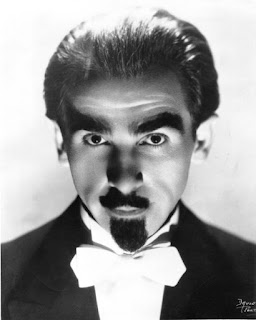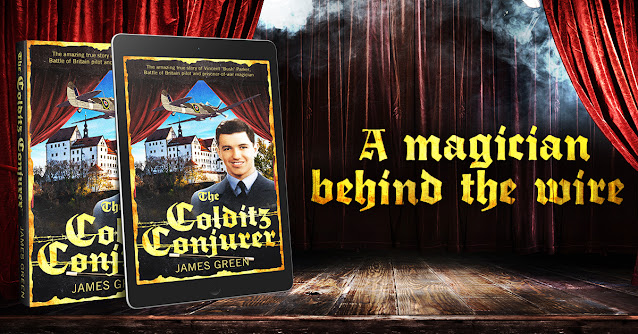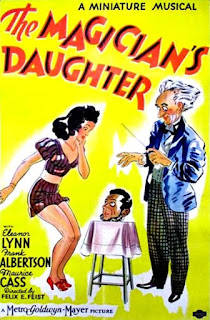Will Rock
was one of many magicians drafted into military service
during World War Two. At the time, Rock was one of America’s foremost illusionists. Luckily for him, the army chose to make use of his magic skills, by putting him in
charge of entertainment in a key training centre. Throwing his all into the task, Rock becoming a first-class soldier
sorcerer for Uncle Sam.
Born William George Rakauskas in Lithuania in 1907, Will Rock and his
family emigrated to the U.S.A. when he was five years old, settling in Detroit, Michigan.
As a young man he worked at a car factory, but left to pursue a
career in magic.
Inspired by magicians such as Eugene Laurant, Rock put together act and,
by 1928, he was performing in the lesser vaudeville circuits. In 1931 he became
an assistant to The Great Raymond, learning his craft and saving up the money
needed to mount his own show.
Will Rock, 1938
(Source: Genii Magazine)
In 1938,
two years after Howard Thurston ‘the last greatest magician in the world’ died,
Rock bought the show, along with the rights to use the Thurston name in his
advertising. The scene was set for Rock
to establish himself as Thurston’s successor.
He put together a full evening show called Thurston’s Miracles of
Magic with Will Rock, or sometimes Will Rock, The Modern Monarch of Magic Presents
Thurston's Mysteries of India and took to the road. The new show was a
success. Billboard magazine gave it a glowing review, saying “Rock
cannot be accused of using the old master’s name in vein.” Travelling with
almost 20 staff and 14 tonnes of equipment, he toured the United States and
Canada, playing 300 cities in a three-year period. Latterly, he gave
Thurston’s name less prominence, billing himself as Will Rock, The Magician also
featuring Thurston’s miracles.
'Will Rock, The Magician also featuring Thurston's Miracles' poster
(Source: Potter & Potter Auctions)
Among Rock's best-known routines was his version of the guillotine (built by famous magic dealer Percy Abbott), where the ‘victim’s’ head seems to fall off and drop into a basket. Magic magazine The Sphinx reported, “Rock’s Guillotine Illusion is probably the most effective presentation of that illusion ever shown.” Other illusions included Thurston’s Million Dollar Mystery, the Doll’s House, The Elusive Lady, Hindu Basket, sawing-a-woman-in half, and a levitation.
In early 1938, Will Rock became an American citizen.
But war was coming. After keeping the magic show on the road during the tail-end of the Great Depression, Rock lost four of his male assistants to military service. He was forced to close the show in 1941, the year that the U.S.A. formally entered World War Two. For the next two years, Rock lived an ordinary life working in the parts department of a Chrysler division, in his home city of Detroit.
On 12 October 1943, Rock was drafted into the U.S. Army, initially to be an engineer. Fortunately, the army soon spotted his magic skills, and transferred him to a Special Services role at Fort Leonard Wood in Missouri.
Fort Leonard Wood, Missouri, U.S.A.
(Source: Public domain)
Private Rock immediately started doing magic shows, entertaining the training cadres passing through the base, patients in the camp’s hospital, at the service clubs for non-commissioned officers, the officers’ clubs, the Red Cross clubs, and at War Bond rallies in the local area. So as not to wear out the tricks he was doing as a magician, Rock read palms and devised other types of entertainment for the troops, like game shows and race nights.
Will Rock (centre) performing the Hindu Turban (cut and restored) trick
(Source: 'Will Rock Presents ...' by Leo Benkhe)
Often Rock would work with other soldiers with show business backgrounds, such as musicians, comics and dancers, to produce larger shows. One of the biggest shows Rock produced had a cast of 60, plus technical crew. Called Rock ‘n’ Rythm [sic] it played to sell-out audiences.
Rock 'n' Rythm poster, featuring Will Rock
(Source: 'Will Rock Presents ...' by Leo Benkhe)
In December 1944, Rock was in an inter-service show that worked War Bond drives for the public. It involved a twenty-man choir from the navy, a thirty-piece army band, a group of Women’s Auxiliary Corps (W.A.C.) performers, and some heavy equipment, like guns and tanks (parked outside the theatres) to draw crowds. He also performed publicity stunts, like driving a jeep through snow-covered streets while blindfolded and with his head tied within a bag.
Making his magic relevant to army audiences, Rock developed, or adapted, tricks to give them a military appeal. He performed a version of the bullet catch trick, where he fired a rifle at a W.A.C. who was holding a deck of playing cards above her head. As he fired, a sheet of glass between him and the girl shattered, while the bullet travelled part-way through the pack and stopped right at a previously selected card.
Will Rock (holding the rifle) shooting a bullet through a pane of glass into a deck of cards held by his assistant
(Source: 'Will Rock Presents ...' by Leo Benkhe)
In a more extravagant example of military theming, Rock proposed to saw a woman in half, swapping out the usual saw for a .30 calibre machine gun. His inspiration for this may have been the opening scene of MGM’s Miracles for Sale, a 1939 film which featured such an illusion. Rock was all set to perform the spectacle in one of his outdoor shows when the base commander got wind of the plan and stopped him going through with it.
Movie still from Miracles for Sale (1939): sawing a woman in half with a machine gun
(Source: Metro-Goldwyn-Mayer)
Although kept busy entertaining U.S. troops and local civilians, Rock also gave shows at the prisoner-of-war (P.O.W.) camp on the base. Camp Leonard Wood was activated as an Enemy Alien Internment Camp in December 1942. It initially held Italian P.O.W.s but later held solely German prisoners, accommodating 5,200 prisoners at its peak.
German P.O.W. shop in Camp Leonard Wood
(Source: Public domain)
Among the P.O.W.s were some highly skilled craftsmen, who the camp authorities allowed sell items they made in shops on the base. Rock commissioned some of these prisoners to make props for his shows. The items included a new set of swords for the Hindu Basket illusion and a set of Chinese Linking Rings.
A turban used by Will Rock and a set of Chinese linking rings made by German POWs
(Source: American Museum of Magic)
Will Rock was promoted to Corporal in July 1944 and to Sergeant on 7 May 1945. The next day, Germany surrendered. Three months later, Japan followed. With the war over, Sergeant Will Rock’s services were no longer required. He was discharged from the U.S. Army on 30 September 1945.
After the war, recognising that movies and television were replacing vaudeville (and not wanting to be on the road while he had a young family) Rock retired from full-time performing. He joined a dry-cleaning business as a driver in 1949, selling the Thurston/Rock illusions several years later.
Will Rock died in 1995, aged 88.
For further reading on Will Rock's life and magic career, see 'Will Rock Presents ...' by his daughter, Leo Behnkhe.
A
lso stationed at Fort Leonard Wood was the U.S. Army's 23rd Headquarters Special Troops, otherwise known as the 'Ghost Army' who specialised in covert deception tactics during World War Two.
Related article: Punx: A POW magician in Wales (and the story of the friendship clock), a blog about German prisoners in an Allied POW camp. Blog linkRelated article: Verdini: Czech magician escapes Nazi blitzkrieg three times, fights in the Battle of Britain...and joins E.N.S.A., a blog about another Eastern European magician who performs for Allied troops. Blog link
Related article: 'Jasper Maskelyne: War Magician?', introduces a BBC Reel short film about the magician and his wartime exploits, working on camouflage and deception. Blog link.
*** AVAILABLE NOW ***
The Colditz Conjurer tells the amazing true story of Flight Lieutenant Vincent ‘Bush’ Parker, Battle of Britain pilot and prisoner-of-war magician.
Written by the Magic at War team, The Colditz Conjurer is a remarkable tale of perseverance, courage and cunning in the face of adversity. It features over 55 original photographs and maps. 126 pages.

















Comments
Post a Comment